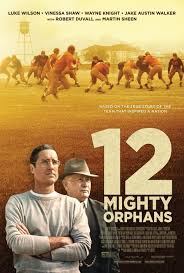
12 MIGHTY ORPHANS
US, 2021, 118 minutes, Colour.
Luke Wilson, Martin Sheen, Wayne Knight, Vanessa Shaw, Jake Austin Walker, Scott haze, Jacob Lofland, Robert Duvall, treat Williams, Larry Pyne.
Directed by Ty Roberts.
This is a film very much in the traditional American spirit, of country and patriotism, love of sport, especially football, appreciation of the underdogs.
It is based on a true story – however, quite a number of the facts and timelines have been altered for the drama.
In the aftermath of World War I (with a number of flashbacks of war action for the central character, Rusty Russell wounded, especially in his eyes but recovering), the film focuses on the Depression and its effect during the 1930s. In particular, it focuses on institutions for orphans, often looked down on in American society as second-class citizens.
Rusty Russell, already a top football coach, takes on the job at the Masonic institution for orphans in Fort Worth, Texas, travelling with his wife and family, his wife a successful English literature teacher. They are played by Luke Wilson and Vinessa Shaw.
The film shows the harsh life of the Institute, especially with one of the staff played by Wayne Knight, in charge of the printing business, exploiting the orphans, physical brutality towards them, and later revealed as embezzling money and colluding with the coach of an opposing team, a vengeful attitude towards Russell.
However, the focus of the film is on the orphans themselves, age 17, rough and ready, one with a particular chip on his shoulder and anger, gradually the group moulding into a team, getting gear from charities, working together with the coach who is inventive in his creation of play, becoming successful, opposed by powers that be with petty regulations and interpretation, the media intervening as well as to and ultimate success. However, with a sober realism, they lose the final championship match.
A number of veteran actors in supporting roles including Martin Sheen, at age 80, as the doctor assistant coach, a glimpse of Robert Duvall at age 90, and Treat Williams and Larry Pine as Roosevelt.
There is a fine tribute to the Russell’s as well as to each of the mighty orphans in the final credits, photos and an admirable list of achievements by each of them.
- Based on a true story? The alteration of facts and timelines? A tribute to Rusty Russell? His wife? Their work with the orphans, football and tactics, love of literature? The final tribute with the details of what happened to Russell and his wife, the 12 orphans themselves, achievement?
- A film of the American spirit, American football, sport, fans, even President Roosevelt, the Depression, the 1930s, poverty, lack of opportunity, the low status of orphans?
- The use of black-and-white photography, for World War I sequences, for the depression, the insertions? The atmosphere of the 1930s, Texas, the family travelling by car, the depressed communities, going to Fort Worth, the Masonic institution? The task of coaching the orphans? Of teaching them? The musical score?
- Russell and his story, the flashbacks to his experience in the trenches, the death of his brother, his blinding, his recovery? The recurring memories? His using his experiences to encourage the orphans? Married to Juanita, giving up a significant post, wanting to help the orphans? His daughters? His appearance and manner, glasses, difficulties with his eyesight? His explanation of his own background as an orphan?
- The Institute, the head, his concern about maintaining the workings, Frank Wynn, the printing, his bullying, hitting the students, his sneering attitudes, the rules, embezzling the money, his link with the rival coach, providing the birth certificate, his mistake, the confrontation with Russell, the hearings, his arrest?
- The orphans, their age, status, back stories, the mother abandoning Wheatie, Hardy, the death of his father, covered in blood, his resentments and anger? The lack of education? Interactions amongst themselves?
- The football theme: the opening, dressing room, the clashes amongst themselves? The rest of the story going back to arrive at this match?
- The boys themselves, their personalities, interactions? Hardy and his resentments, blood, shower, Snoggs trying to help? Continued manifestations of anger? The football field, rough, no shoes? The gradual building up of gear, shoes, pads, jerseys? Football issues? Scenes of training, boys’ reactions? Angers amongst themselves?
- The range of football matches, football scenes, the tactics, Russell’s daughter and her idea, the creative play, Russell changing play styles? The tough matches, the opponents, the referees?
- Doc Hall, age, no salary, his drinking, seeing the boys, a father figure, treating Hardy? Supporting Russell, recommending him? Assistant at the training, intervening in the crises, confronting authorities? At the games? His having to give up the drink?
- Juanita, supportive of her husband? The rough housing, settling in, her classes, enthusiasm, the boys and their learning?
- The rivalries, the hearings, Roy Kidd and the writing of the manual, his wanting to exclude the Mites, Doc Hall and the text? The hearings for their expulsion, his brother-in-law as the smug coach? The intervention of Amon Carter, his newspapers, watching the matches, his bets, links with the journalist, the reporting? The intervention of Roosevelt and the reversal of the decision?
- The hostile coach, setting up the big player to eliminate rivals? The hospitalisation of Fairbanks? Hardy, playing, his success, tactics? Eventually supporting the war cry?
- The failure to win, Hardy blaming himself, yet public support, fans, letters, demonstrations?
- The spirit of the Mites, the coach, love for football?
- The impressive tribute to the end and the careers of Russell and his wife and the orphans themselves, achievements?